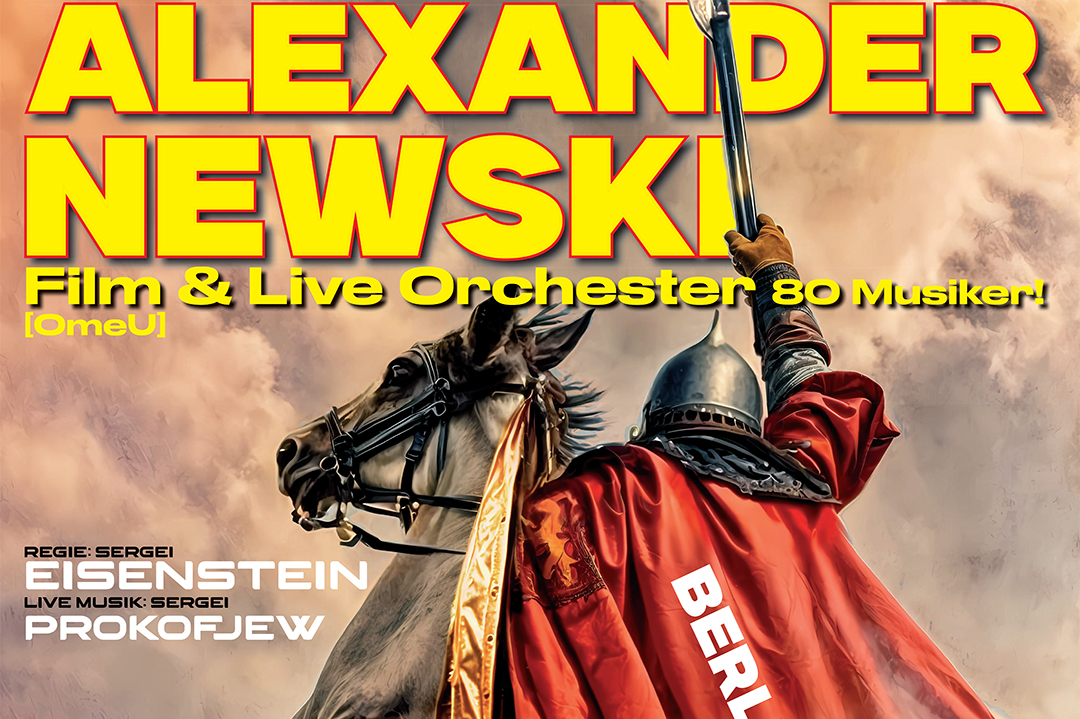Alexander Newski, Live mit Orchester und Chor [Александр Невский] [OmeU]
SU 1938, R: Sergei Eisenstein, Dmitri Wassiljew, Musik: Sergej Prokofjew, mit Nikolai Tscherkassow, Nikolai Ochlopkow, Andrei Abrikossow, 112 Min
Die Musik schrieb kein geringerer als Sergej Prokofjew, und wurde bearbeitet von Frank Strobel, Chorleiter Jonas Wilfert, Dirigentin Nefeli Choadouli
Der Krieg ist aus.
Kann sich der Mensch noch einmal gegen die tödlichen Maschinen durchsetzen?
Eisenstein und Prokofjew schaffen trotz allem Waffengetümmel im Jahr 1442!, auf dem Eis des zugefroren Peipussee, einen Appell an den Frieden.
Wie kann es auch anders sein?
Der Regisseur des Potemkin ist sich treu geblieben.
80 Musiker bringen den Resonanzboden des Hauses zum vibrieren.
Das wollen wir in diesen Tagen im Stillen gedenken und mit diesem Meisterwerk feiern.
Atemberaubend
ENGLISH
The war is over.
Can man once again prevail against the deadly machines?
Eisenstein and Prokofiev create an appeal for peace on the ice of the frozen Lake Peipus in the year 1442, despite all the weapons.
How could it be otherwise?
The director of Potemkin has remained true to himself.
80 musicians make the soundboard of the house vibrate.
We want to commemorate this in silence these days and celebrate with this masterpiece.
Breathtaking.
Russland im Jahr 1242: Teile des Landes sind von Mongolen besetzt, und aus dem Westen nähert sich Nowgorod eine weitere Bedrohung. Eine Streitmacht des Deutschen Ordens und des mit ihm vereinigten Schwertbrüderordens hat bereits die strategisch wichtige Stadt Pskow eingenommen, in der die Invasoren mit äußerster Brutalität regieren. Nun schlägt die Stunde für den Nowgoroder Fürsten Alexander Jaroslawitsch Newski. ... Alexander Newski stellt einen Meilenstein in Sergei Eisensteins Werk dar.(Wikipedia)
ENGL.
The film ‘Alexander Nevsky’ is one of Sergei Eisenstein's best works.
It is a historical film about the outstanding Russian commander who defeated the Knights of the Teutonic Order.
Prince Alexander's ingenious plan and the courage of his warriors brought victory to his army at the Battle of Lake Peipsi in 1242.
Sergei Prokofiev wrote the music for the film and created a complete symphony with a choral part. Subsequently, the symphony ‘Alexander Nevsky’ was often performed as an independent piece of music.
‘Alexander Nevsky’ laid the foundation for the use of a variety of techniques that are still popular today in the age of computer technology. In addition to the master of cinematography Sergei Eisenstein, the talented cameraman Eduard Tisse also worked on the film.
His cameraman's method of shooting the fight scenes and movements dynamically made it possible to create the impression that the viewer was present in the picture.
The film was quoted many times, its costumes served as a model for many costume designers, and one of its fight scenes was completely recreated in one of the parts of the film ‘The Lord of the Rings’.
